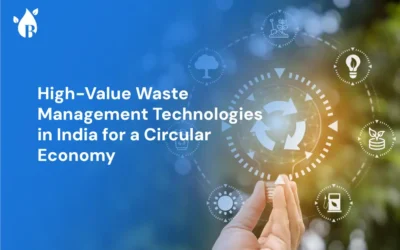India, a country with a population exceeding 1.3 billion, generates an enormous amount of waste daily. While this presents significant challenges, it also opens the door to innovative solutions that can transform waste management into a sustainable, high-value endeavor. In the pursuit of a circular economy, India has been exploring and implementing waste management technologies that not only reduce environmental impact but also create economic opportunities.
Understanding the Circular Economy
A circular economy is a regenerative system that aims to minimize waste and make the most of resources. It’s a stark departure from the traditional linear economy, where products are manufactured, used, and discarded. In a circular economy, waste is minimized, and products are designed for reuse, remanufacturing, and recycling.
The Challenge of High-Value Waste Management in India
India’s waste management challenges are multifaceted, with issues of landfill overflow, pollution, and the unsustainable use of resources. However, these challenges are driving the exploration of high-value waste management technologies that can turn these issues into opportunities.
Key Technologies Transforming Waste Management in India
- Waste-to-Energy (WtE) Plants: These facilities convert organic waste into electricity or heat, providing a sustainable source of energy while reducing landfill waste. Companies like Thermax and GEPIL have been pioneers in developing WtE technologies in India.
- Plastic Recycling: Plastic waste is a global concern, and India is no exception. Innovations in plastic recycling, such as those by Green-O-Tech India, are turning plastic waste into valuable resources.
- E-Waste Management: With the rapid proliferation of electronic devices, India has witnessed a surge in electronic waste. Companies like Attero Recycling are pioneering e-waste recycling and responsible disposal.
- Biofuel from Organic Waste: India’s rich agricultural landscape makes it an ideal candidate for the production of biofuels from organic waste. Companies like Praj Industries have been instrumental in developing technologies for this purpose.
- Construction and Demolition Waste Recycling: The construction industry generates significant waste. Initiatives like IL&FS Environment are pioneering technologies to recycle construction and demolition waste into reusable materials.
- Textile Waste Recycling: India is a major textile producer, and recycling textile waste has become a significant focus. Companies like Sure Safety India are contributing to this sustainable endeavor.
The Economic and Environmental Benefits
The adoption of high-value waste management technologies in India offers several benefits:
- Reduced Environmental Impact: These technologies minimize pollution, conserve resources, and reduce the need for landfills.
- Job Creation: The waste management industry can create job opportunities, especially in recycling and waste-to-energy sectors.
- Resource Recovery: Valuable materials are recovered from waste streams, reducing the need for virgin resources.
- Energy Generation: Waste-to-energy technologies provide a sustainable source of electricity or heat.
Challenges and the Way Forward
While India is making strides in high-value waste management, challenges persist. These include the need for improved infrastructure, regulations, and public awareness. Collaboration between the government, private sector, and the public is essential to overcome these challenges.
In conclusion, high-value waste management technologies in India are paving the way for a circular economy. They are not only reducing environmental impact but also creating economic opportunities and contributing to a more sustainable future. As India continues to embrace these innovations, it moves one step closer to achieving the goals of a circular economy while addressing its waste management challenges.

